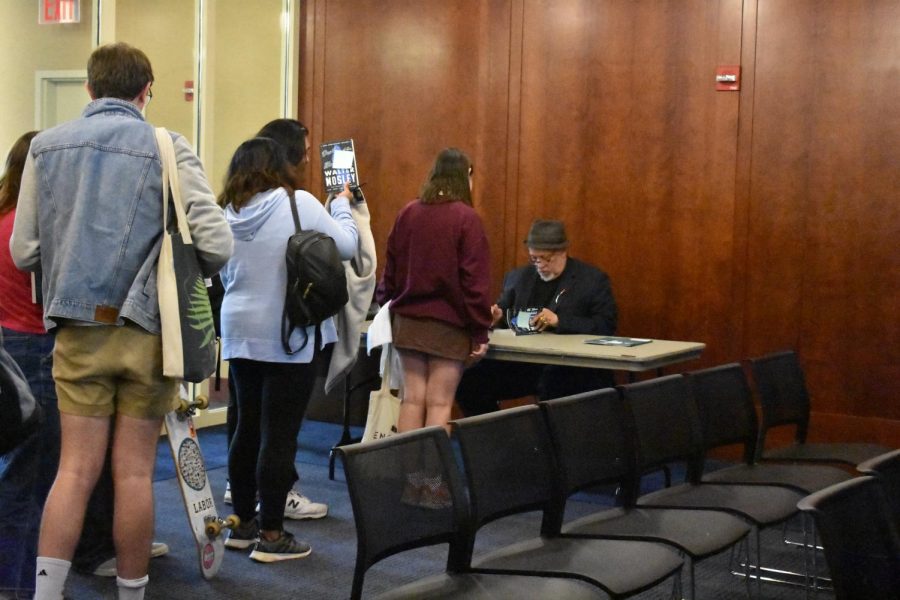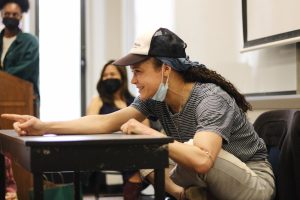Fordham’s English Department Hosts Author Walter Mosley
Novelist and commentator Walter Mosley speaks at Mary Higgins Clark Chair Keynote Address
Walter Mosley’s novel “Devil in a Blue Dress” was adapted into a movie starring Denzel Washington, FCLC ’77.
October 12, 2022
Fordham’s English department hosted its annual Mary Higgins Clark Chair event on Oct. 6 in the Pope Auditorium with special guest Walter Mosley. The Mary Higgins Clark Chair invites all Fordham students and aspiring writers to receive guidance and advice from widely praised writers such as Mosley.
After graduating from Johnson State College, Mosley worked as a computer programmer for close to 20 years until beginning his writing career. He’s best known for his work in the crime-mystery genre. Mosley’s most famous book, “Devil in a Blue Dress,” a story about a Black veteran hired to investigate the disappearance of Daphne Monet, was even adapted into a movie, which starred Denzel Washington, Fordham College at Lincoln Center ’77.
Mosley explained that as he grew up, he often contemplated what is right and wrong, and what is entirely true. He realized that when he read books and watched shows or movies, he saw very few depictions of Black protagonists. Mosley couldn’t understand why this was the case because it was the opposite of what he knew. He had heard stories of courageous heroes withstanding every obstacle in their way, but none of his people’s stories were depicted.
“What I need is the world to be infused with the history of the hands that helped build this world,” Mosley said. “Black men have always been seen as the enemy.”
He realized that the stories of Black people were being forgotten — their history, their hard work, their fights, their passion, their blood and tears, and their voices. He decided that he would find a way to “reclaim his people,” which he would do through writing. Mosley created Black characters with dreams and lifestyles that are the same as white characters, but he also incorporated the racism and harsh realities that the Black man faces.
Mosley said that white people don’t truly understand the feelings of his Black characters, and they don’t understand why Mosley wanted to tell these stories.
He added that he doesn’t intend to put down other people or cultures with his stories but rather to celebrate all the people that have had their history taken away from them.
“My goal is to know people and find people, like painters and musicians, anyone whose interpretation of the world changes my world.” Walter Mosley
“I don’t celebrate the Black men for their imperfections,” he said. “I celebrate those of us that have survived the prejudices of so-called ‘white’ people that don’t understand their own history.”
His speech burrowed snugly into the internal crevices of every audience member’s heart and soul, no matter who they were, which led to a standing ovation. Some were even brought to tears, which showed that Mosley has an exquisite way with words.
Shortly after, folks went from a heavy, saccharine heart to tears of laughter when Mosley began answering students’ questions. When asked if he could have dinner with any literary character, who would it be, he found himself at a loss for words. He then answered that he doesn’t know many characters from other books.
Rather, he spoke to the value in connecting with others in his community that are not writers.
“Writers are a part of the world, and they’re speaking to the world and for the world. It’s not about a writer knowing another writer — it’s about the writer knowing the world,” Mosley continued. “I don’t want to be with other writers. My goal is to know people and find people, like painters and musicians, anyone whose interpretation of the world changes my world.”
He also said that he believes anyone with a story to tell should tell it; they shouldn’t wait until they feel “ready.”
“There is no such thing as a finished book,” Mosley said. “For me, I write it, then fix the mistakes, do that again about twenty times until I don’t know how to fix them anymore, and then it’s finished.”
He added that writing is an extensive process. It may take a writer a long time to put their knowledge into words, but it will get done if you continue to believe in what you’re saying.
“First, you see that there’s something wrong. It may be language or grammar or punctuation or tone, and it takes a lot of time to figure out what you’re trying to say. But you don’t know how to say it. So, you have to figure out a way to say it,” Mosley explained.
Mosley ended the event with a statement to touch the hearts of all writers.
“The best thing to happen to me since I’ve started writing is writing,” he said. “I like writing more than all the awards I’ve won. To me, being a writer is its own reward.”














